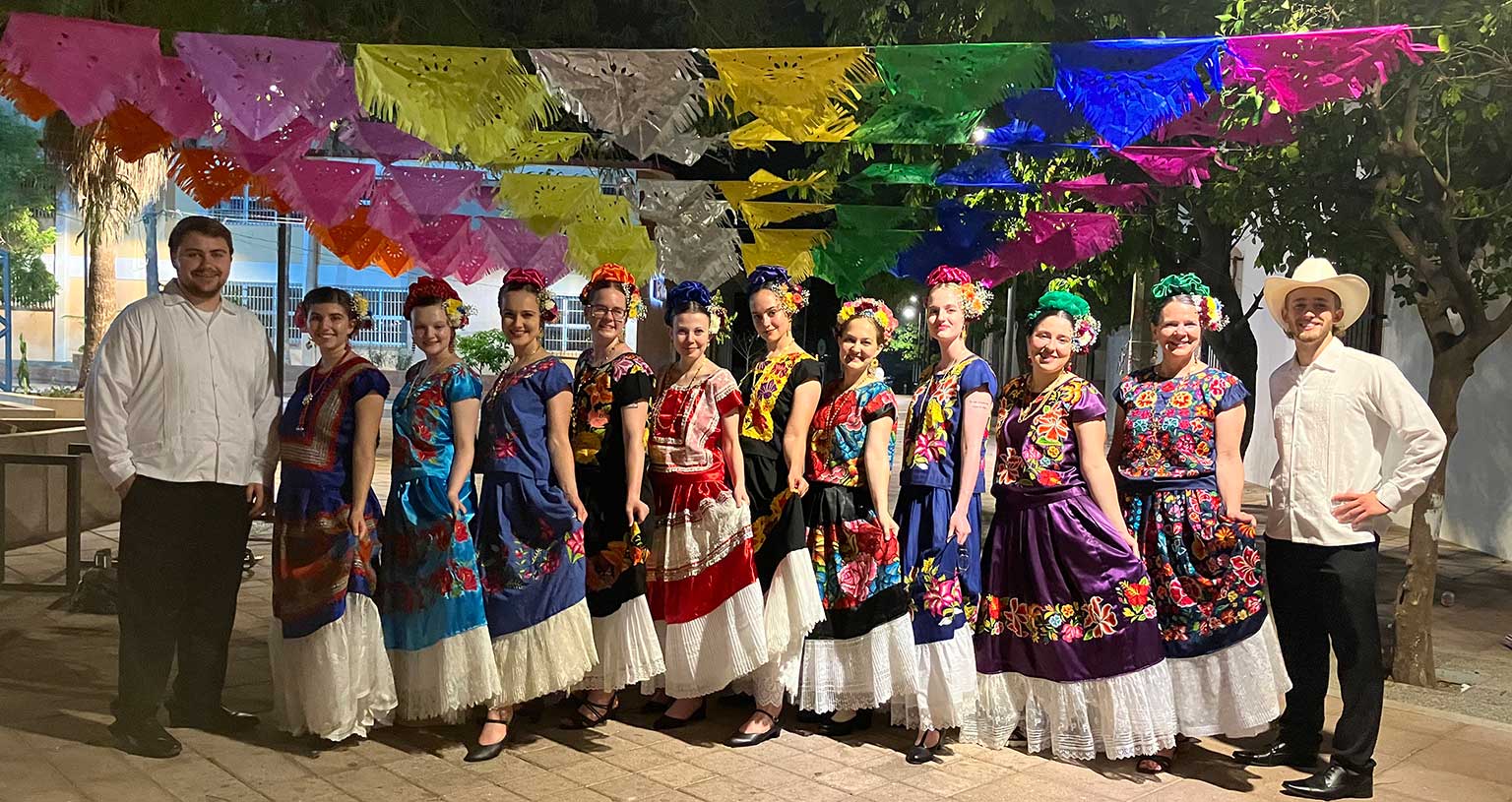This spring saw the first non-COVID impacted offering of the joint Anthropology/Collins international ASPIRE course titled Self-Governance, Sustainability, and the Arts in Oaxaca, Mexico. This was offered as second 8-weeks IUB course with two weeks of travel in Mexico from May 7-21. Taught by Prof. Stacie King, the incoming Chair of the Anthropology Department, it features a star teaching team, including PhD candidate P. Guillermo Ramón Celis, Professor Emeritus Anya Royce and Associate Professor Dan Suslak. Ramón Celis and Profs. King, Suslak, and Royce have each (independently) conducted anthropological fieldwork in Oaxaca, Mexico for decades from multiple specialties: archaeology, linguistic anthropology, and social-cultural anthropology. Each was responsible for planning a few days of course activities in Mexico. During class meetings in the U.S., students discussed readings and films that helped to contextualize the social, political, economic, and linguistic contexts in which contemporary Oaxacans are embedded. By doing pre-departure work, the students were prepared to appreciate and recognize the diverse ways that Oaxacans embrace cultural identity, political action, and community in their everyday lives.
Oaxaca Program

Oaxaca is full of color, flavor, beauty, and stories old and new. Upon arrival in Oaxaca, the students spent several days learning about the architecture, history, politics, and markets in and around Oaxaca City. Using the city as a base, they ate delicious food, learned about political street art, and visited incredible museums, archaeological laboratories, and archaeological sites. A highlight was the UNESCO world heritage Zapotec archaeological site of Monte Albán, where we had the privilege of taking a sunset tour with IU alum Dr. Ricardo Higelin Ponce de Leon. An important learning experience was our hike to the Prehistoric Caves of Mitla and Yagul. Guila Naquitz is a cave where archaeologists found the earliest domesticated plant species in the Americas (squash at 8500 BC). But even more important was seeing how this heritage is managed. Here, it is the local indigenous land committee representatives who guide tours and collect payment rather than the Mexican government officials or archaeologists; tourism profits go directly to the indigenous landowners.
Students had the experience of traveling up into the mountains of Sierra Norte, over the continental divide, to the Mixe town of Totontepec Villa de Morelos. Totontepec is one of 418 municipalities in Oaxaca that still operates using a system of customary law and communal governance known as usos y costumbres. They spent several days with amazing hosts, who were friends and colleagues of Prof. Suslak, and viewed Mother’s Day festivities and dance performances by schoolchildren and the community bands. Two of the IU students had never seen a mountain before coming on this trip. Six had never climbed a mountain, and yet here they were doing both! They survived a major thunderstorm that produced spectacular hail and lightning and knocked out the power and cellular network for the rest of the visit., and ] shared incredible home-cooked meals and learned about care and community.
The group closed out the 2023 Oaxaca program with a trip to the city of Juchitán de Zaragoza, located in the coastal Isthmus of Tehuantepec. The students withstood the 100-degree heat and extreme humidity and hiked to the Zapotec hilltop Postclassic city of Guiengola, where Ramón Celis had just completed his dissertation research. They toured the Foro Ecológico (Ecological Forum) and its iguana nursery, visited a windmill farm, and then capped off the visit by attending a traditional vela, an invitation-only Zapotec religious festival. This part of the trip could not have been successful without Dr. Royce and her sister Delia Ramirez. They opened their hearts and home to the group, preparing everything the students needed for the event, tailoring the dresses, doing their hair, buying fresh flowers, and most importantly, accompanying them to the vela. Everyone not only looked right, but they understood what a privilege it was to be there. The students had the times of their lives on the dance floor. The trip ended with an unforgettable rooftop dinner in Oaxaca City, eating traditional Mixtec cuisine.
Students found this course to be an incredibly special and rewarding experience in their journey at IU. The students also became very close to one another and were grateful for the chance to learn and travel together. They were deeply respectful, socially engaged, intellectually curious, enthusiastic, and ready for (almost!) anything!
 The College of Arts
The College of Arts